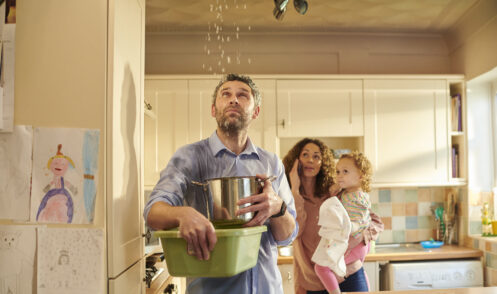A burst pipe can quickly escalate from a minor inconvenience to a significant disaster, causing extensive water damage and expensive repairs. Understanding the causes, symptoms, and immediate steps to take can assist homeowners in effectively managing this situation.
Causes of Pipe Bursts
Pipe bursts can occur for a variety of reasons, including temperature fluctuations, corrosion, water pressure issues, and physical damage.
Temperature fluctuations are especially noticeable in areas that experience freezing winters. When water inside a pipe freezes, it expands and creates pressure. If the pressure exceeds the pipe’s capacity, it may rupture. This is especially true for uninsulated pipes found in basements, attics, or outside walls. Corrosion is another major cause of pipe bursts. Pipes, especially older metal ones, can deteriorate over time as a result of exposure to moisture, chemicals, and even minerals found in water. Corroded pipes become weak and can leak or burst under pressure.
Water pressure issues can also lead to pipe bursts. If the water pressure in the plumbing system exceeds the recommended limits, the pipes can become strained, especially in older homes with outdated plumbing. High water pressure can cause stress on joints and fittings, resulting in failure. Physical damage is another common cause of pipe ruptures. This can happen during construction, landscaping, or even impacts caused by heavy objects. For example, if a shovel accidentally strikes a pipe while digging in the yard, it may cause a crack or break.
Signs of a Burst Pipe
If homeowners can spot the signs of a burst pipe early, they can avoid a lot of damage and expensive repairs. Water stains that appear out of nowhere on walls, ceilings, or floors are one of the first signs. If you see this, it could mean water leaks from a pipe into your home. Another common sign is a sudden rise in water bills without changing how much water is used. A big jump could mean a leak or a pipe that has burst somewhere in the system.
Homeowners may sometimes notice the water pressure drops when using faucets or appliances. Loss of pressure from a burst pipe can make it hard to use plumbing fixtures properly because water flow can be slowed down.
A burst pipe can also be identified by bad smells or the growth of mold and mildew. When water leaks, it can leave behind damp conditions that allow mold to grow. This can be bad for your health and damage your property even more. People should also be aware of the sound of water running when none of the faucets are turned on. It could be a sign of a leak or a broken pipe if you hear water moving behind walls or ceilings.
Immediate Actions to Take
If you think a pipe has burst, you need to act quickly to limit the damage. To stop more water from getting into the system, first find the main water shut-off valve and turn it off. This can make flooding less likely and lower the chance that water will damage your property. Once the water is off, you should look at what’s going on. Move furniture and valuables to higher ground to protect them from water damage if there is a lot of flooding. If it’s safe, try to keep the water in one place by using buckets or towels to soak up the extra water.
Next, contact a licensed plumber to assess the damage and fix it. Trying to fix the problem without professional help could make it worse or put you in danger. It’s essential to get a professional’s opinion on how bad the damage is and what needs to be done to fix it. If the burst pipe caused extensive flooding, you might want to call your insurance company and explain what happened. Many homeowner’s insurance plans cover water damage from burst pipes, but it’s essential to take pictures of the damage and track how much it costs to fix.
Long-Term Prevention Strategies
Several things need to be done to keep your plumbing system in good shape so that pipes don’t burst again. One of the best ways is to insulate easily damaged pipes, especially those in unheated parts of your home, like attics, crawl spaces, and basements. Pipe insulation keeps pipes from freezing and lowers the chance of bursting in the winter.
Maintaining your plumbing system on a regular basis is important for finding problems early on. A licensed plumber should be called in for regular checks to look for signs of corrosion, wear, or pressure problems. A professional can also look at your pipes and tell you what upgrades or repairs you need.
You might want to install a pressure regulator if you live in an area with high water pressure. This device helps keep the pressure in the plumbing system steady, which makes pipes and fittings last longer.
Finally, watch what you put down the toilets and drains. Do not flush anything but toilet paper and human waste. Putting things other than toilet paper and human waste down the toilet can cause clogs and higher pressure in the pipes. Maintain and clean drains on a regular basis to stop buildup that can clog them and even cause them to burst.
Contact Us Today
Every homeowner should understand the causes and signs of a burst pipe. Acting quickly when a burst occurs and implementing preventive measures can protect your home from significant damage and costly repairs. If you have a plumbing emergency or need help with preventative maintenance, contact the experts at Winfrey Plumbing in Omaha, NE. We also provide services for water treatment, drain cleaning, water heaters, bathroom remodeling, septic system issues, and more. Our skilled plumbers are here to provide prompt, dependable plumbing repair service to keep your plumbing system running smoothly.


